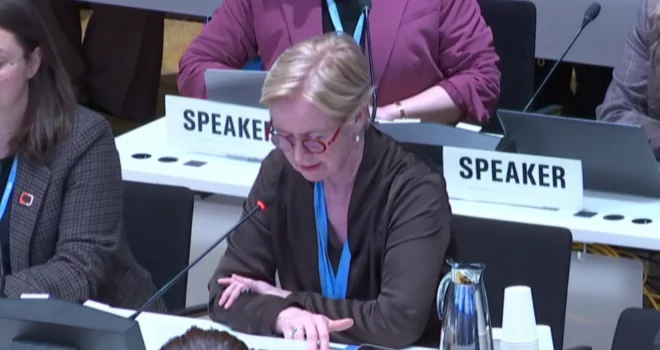Geneva (28 January 2021) – Air pollution is a key risk factor for cardiovascular disease, and a major contributor to the global burden of disease. Long-term exposure to air pollution has also been linked to an increased risk of death from COVID-19. This dangerous “triple threat” of air pollution, COVID-19 and cardiovascular disease should be taken seriously, warn major health authorities.
Four leading cardiovascular organizations – the World Heart Federation (WHF), American College of Cardiology (ACC), American Heart Association (AHA) and European Society of Cardiology (ESC) – today released a joint statement urging the medical community and health authorities to mitigate the impact of air pollution on people’s health.
In 2019, an estimated 6.7 million deaths, or 12 percent of all deaths worldwide, were attributable to outdoor or household air pollution. As many as half of these were due to cardiovascular disease. Air pollution also increases the risk of heart attack, stroke, diabetes and respiratory diseases, which are known to raise a person’s risk of experiencing some of the more severe consequences of COVID-19.
“Even before the COVID-19 pandemic, air pollution was an issue of growing concern due to its impact on people’s health, although it was frequently overlooked as a risk factor for cardiovascular disease. COVID-19 has brought a new, deadly factor to the equation, and the time has come for the health community to speak up and take action,” said Michael Brauer, Chair of the World Heart Federation Air Pollution Expert Group and co-author of the statement.
The statement calls for structural actions to reduce emissions of air pollutants and harmful exposure. It also highlights the important role that healthcare providers play in preventing illnesses related to air pollution, including:
- Advocating for air pollution mitigation as a health measure, further research on air quality and its impact on CVD, and interventions to reduce air pollution and its effect on NCDs
- Providing patients with personal measures to reduce exposure, such as room air filtration systems
- Integrating air pollution into disease management approaches, for example through the use of air quality indices
- Participating in the development of guidelines on air pollution and CVD
- Supporting ministries of environment, energy, and transportation in their mitigation efforts
- Working to educate and raise awareness on the cardiovascular benefits of clean air
- Collaborating with senior decision-makers in national, regional, and global governmental institutions to make air pollution related heart disease a priority
The statement will be published simultaneously in the flagship journals of all four organizations: the Journal of the American College of Cardiology (JACC), the Journal of the American Heart Association (JAHA), the European Heart Journal (EHJ) and Global Heart.
******************************
“Clinicians have a responsibility to educate their patients, their colleagues and their communities at large on the connection between air pollution and cardiovascular disease risk,” said Richard Kovacs, MD, MACC, senior author of the joint statement and ACC Immediate Past President. “By advocating for recognition of air pollution as a health factor, working individually with our patients to reduce exposure and associated risks, and integrating air pollution into broader disease management approaches, the health care community can provide support for larger pollution mitigation efforts.”
“Poor air quality can harm heart and brain health, with a disproportionate impact on low-income and poor communities located near sources of air pollution,” said Robert Harrington, M.D., FAHA, Arthur L. Bloomfield Professor of Medicine and Chair of the Department of Medicine at Stanford University, Immediate Past President of the American Heart Association and a co-author of the statement. “We must address this problem as a global community to equitably reduce exposure to air pollution and reverse the health harms of poor air quality for all.”
“Air pollution is one of the most underestimated causes of heart disease and stroke,” said Professor Stephan Achenbach, President of the European Society of Cardiology. “More research is urgently required to identify susceptible populations and to determine the optimal methods of improving air quality to benefit cardiovascular health. Air pollution needs to be recognized as a major modifiable risk factor in the prevention and management of cardiovascular disease, and measures to reduce its detrimental short-term and long-term influence on cardiovascular health, potentially over generations, are urgently required.”
******************************
Media Contacts
Dana Kauffman, Media Relations Associate, ACC, dkauffman@acc.org
Suzette Harris, Media Advocacy Director, AHA, suzette.harris@heart.org
Jackie Partarrieu, Media Team Manager, ESC, press@escardio.org
Mihela Kralj, Communications Manager, WHF, mihela.kralj@worldheart.org


